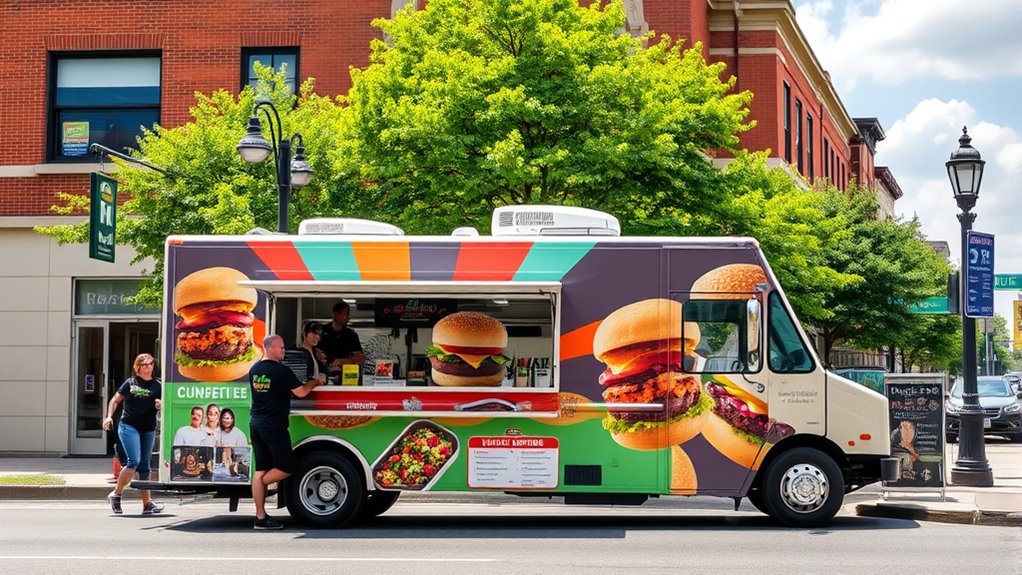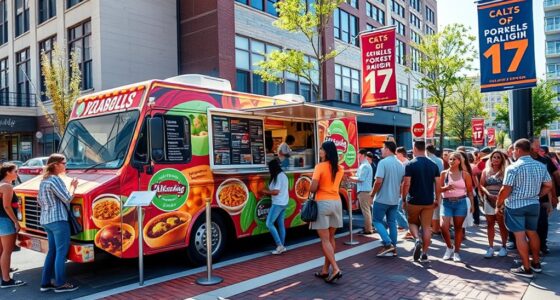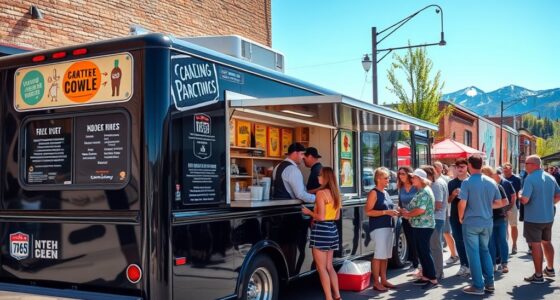To open a food truck in Naperville, you’ll need permits like the Illinois MFD license ($700) and possibly a Mobile Food Permit ($1,000), plus health, fire safety, and special event approvals. Startup costs range from $50,000 to over $250,000 for the truck, equipment, and permits. Prime locations include busy shopping centers, events, or transit hubs. Craft a compliant menu with allergen info and plan effective marketing strategies. Keep in mind regulatory compliance to guarantee smooth daily operations—more details help you succeed.
Key Takeaways
- Obtain necessary permits and licenses, including Illinois MFD and MFP, pass health and fire inspections, and display permits visibly.
- Budget startup costs between $50,000 and $250,000, covering vehicle, permits, inventory, insurance, and marketing.
- Choose high-traffic locations like shopping centers, events, and transit hubs, ensuring compliance with city regulations and utilities.
- Develop a simple, compliant menu emphasizing quality, allergen info, and seasonal ingredients; promote with social media and partnerships.
- Manage daily operations by tracking permits, adhering to noise and operational hours, maintaining equipment, and using eco-friendly transportation for errands.
Navigating Necessary Permits and Licensing Processes
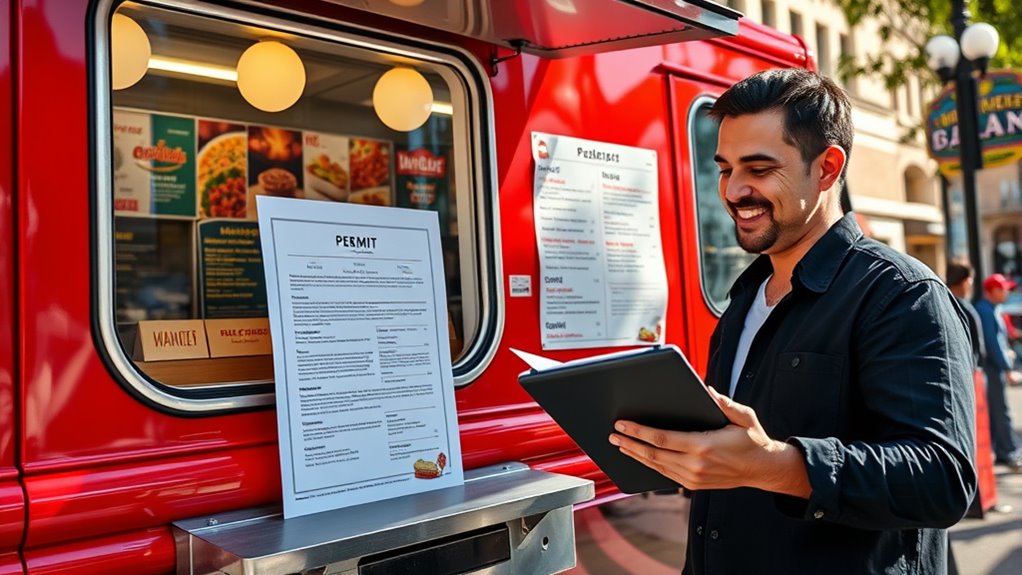
Starting a food truck in Naperville requires maneuvering a variety of permits and licenses to operate legally. You’ll need an Illinois Mobile Food Dispenser (MFD) license if your food is prepared elsewhere, or a Mobile Food Preparer (MFP) license if you cook on the truck. MFD costs $700 per vehicle for two years, while MFP is $1,000. You must submit a Business Information Sheet, government-issued ID, Federal EIN, and Illinois State File Number. Your truck must pass inspections from state health and fire departments. Additionally, if you plan to operate at special events or on city property, you’ll need specific permits through Naperville’s Civic Access portal. These ensure your food truck complies with local health, safety, and city regulations. Incorporating a comprehensive understanding of health and safety regulations can help streamline your permit process and ensure compliance.
Estimating and Managing Startup and Operating Expenses
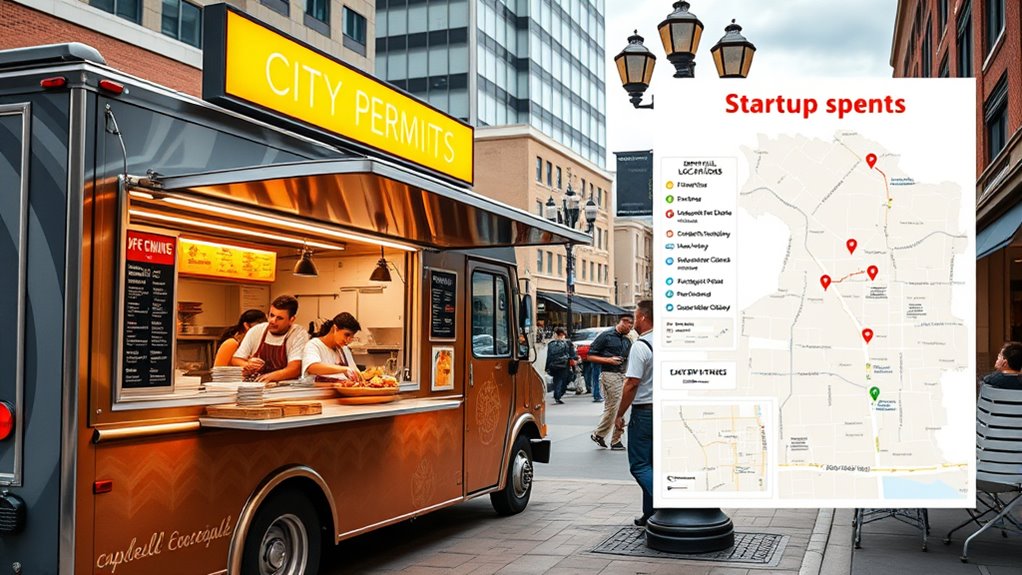
To successfully launch your food truck, you need to estimate your startup costs and keep ongoing expenses in check. You’ll want to budget for the truck, permits, inventory, and marketing, which can range from $50,000 to over $250,000 initially. Managing operational costs like fuel, supplies, and staffing is key to maintaining profitability as you grow. Understanding local regulations can help you avoid unexpected expenses and ensure compliance from the start. Incorporating cost-effective ingredient choices and efficient kitchen equipment can further help control expenses and maximize profit margins.
Startup Budget Breakdown
Estimating and managing your startup and operating expenses is essential for launching a successful food truck in Naperville. Your initial vehicle costs can range from $40,000 to $150,000, depending on whether you buy new or used, plus additional customization for your kitchen and truck build-out, which can add $15,000 to $100,000. Renting a truck may lower upfront costs but can increase long-term expenses. You’ll also need to budget around $1,000 to $3,000 for initial inventory, including ingredients and disposables. Permit and license fees vary but generally average $1,864, with Illinois-specific costs for registration and health permits. Don’t forget to allocate funds for branding, marketing, insurance, fuel, maintenance, and contingency expenses to cover unexpected costs. Proper budgeting guarantees you’re prepared for every stage of your food truck launch. In addition, Food truck costs can differ significantly based on factors like location, truck size, and equipment choices, making thorough research vital for accurate planning. Moreover, understanding projector technology can help in selecting the right equipment if you plan to incorporate multimedia displays into your food truck setup.
Operational Cost Management
Managing your operational costs effectively is key to keeping your food truck profitable in Naperville. Fuel and propane expenses can range from $300 to $1,000 a month, depending on routes and generator use. A generator can cost $500 to $3,000, influenced by size and power needs. Regular maintenance—engine, tires, equipment—costs about $500 to $1,000 monthly, with proactive schedules reducing unexpected repairs. Labor costs, for 2 to 4 staff per shift, typically fall between $6,000 and $12,000 monthly, influenced by wages and scheduling. Inventory costs vary from $1,000 to $5,000, depending on menu complexity. Marketing expenses, around 12-20% of gross revenue, support customer acquisition. Monitoring expenses closely is essential for maintaining profitability, as unexpected costs can significantly impact your bottom line and require quick adjustments. Staying informed about cost management strategies can help optimize your budget and improve overall business sustainability.
Optimal Locations for Food Truck Operations in Naperville
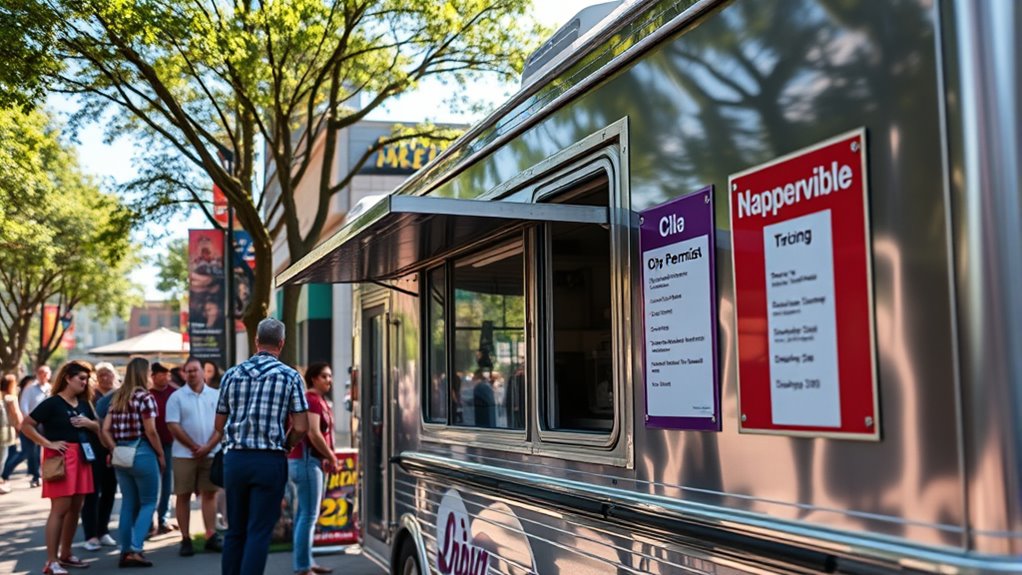
Finding the best locations for your food truck in Naperville requires understanding both the city’s regulations and the areas with high customer potential. Since street vending is prohibited, focus on private properties like shopping centers, gas stations, and business parking lots. High-foot-traffic spots near office complexes or retail hubs attract more customers during peak hours. Participating in city-approved events in parks or streets with proper permits also boosts visibility. Always ensure sites have loading zones and utilities if needed. Be mindful of community preferences, avoiding quiet residential zones to prevent complaints. Additionally, regulatory considerations mean it is essential to carefully select locations that comply with existing rules and community standards. Here’s a quick overview:
| Location Type | Key Considerations | Restrictions/Permits |
|---|---|---|
| Private Business Lots | High traffic, convenient access | Pending regulation, permits needed |
| Special Events | Large crowds, temporary setup | Requires city approval, permits |
| Transit & Commuter Hubs | Peak lunch hours, high visibility | No street vending, permits required |
Crafting a Compliant and Appealing Menu
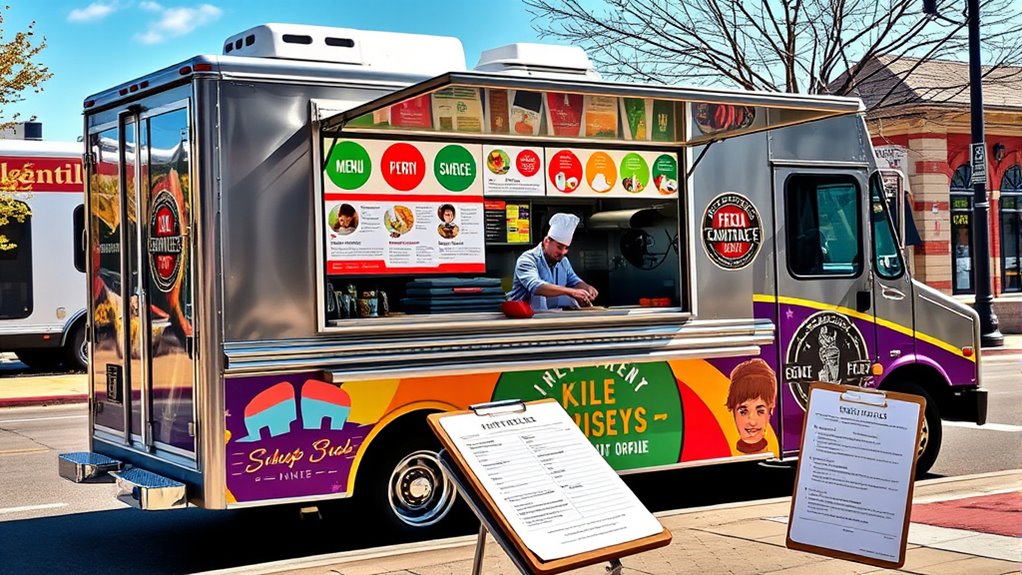
Creating a menu that complies with Naperville’s food truck regulations and appeals to customers requires careful planning. You must guarantee your menu meets local health and safety standards, including allergen labeling for sesame and other major allergens. Focus on items that are feasible for mobile preparation, emphasizing simple, sanitary steps to streamline inspections. Limit high-risk foods needing complex temperature controls to reduce violations. Incorporate diverse options like vegetarian, vegan, and allergen-free dishes, using seasonal ingredients to attract repeat customers. Opt for quick-serve, handheld foods suited for fast service and limited space. Keep your menu concise, emphasizing quality and specialty items, which simplifies inventory management. Clear ingredient lists, allergen info, and appealing visuals will build trust and enhance customer experience. Additionally, designing your menu to attract repeat customers by offering seasonal or rotating specials can foster loyalty and encourage frequent visits.
Effective Marketing Strategies to Grow Your Food Truck Business
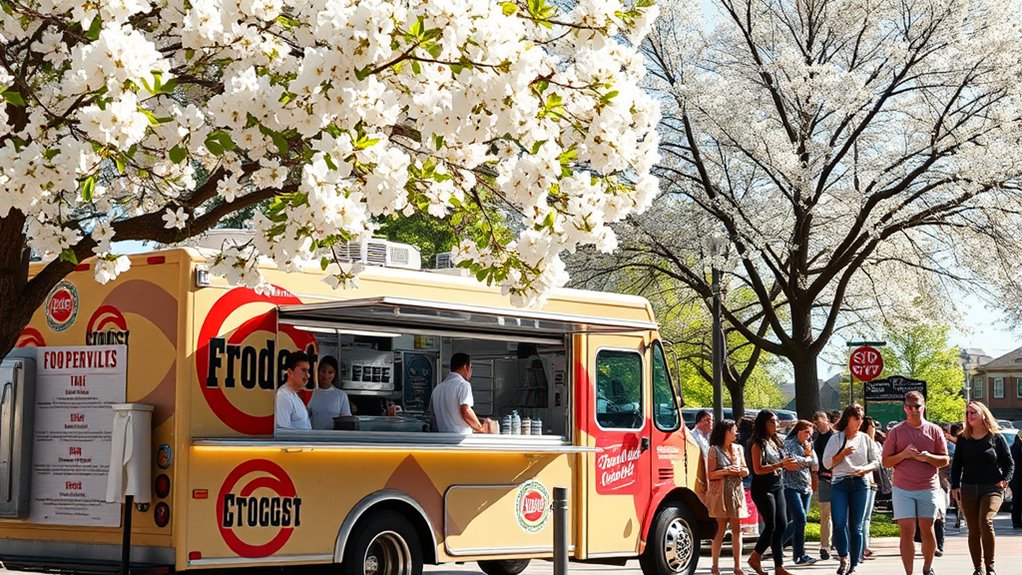
Wondering how to attract more customers and boost sales for your food truck? Leveraging social media is your best bet. About 68% of food truck owners use platforms like Facebook to promote their business, with 75% actively marketing there. Social media campaigns can increase sales by 20%, and active engagement encourages customers to spend roughly 15% more. Plus, 40% of customers discover their favorite trucks through social media ads, highlighting its power. Participating in local events and festivals also boosts visibility—80% of trucks attend at least three annually, creating buzz and customer loyalty through face-to-face interactions. Building local partnerships with businesses, breweries, and community groups, along with utilizing mobile apps and targeted email campaigns, can further grow your customer base and drive repeat business. According to industry data, incorporating seasonal and holiday-themed promotions can lead to a 25% increase in customer visits, further enhancing your marketing efforts. Additionally, tracking your website performance metrics can help identify the most effective marketing channels and optimize your outreach strategies.
Ensuring Regulatory Compliance and Successful Daily Operations

To keep your food truck running smoothly, you need to meet specific display and permit requirements, like ensuring your permits are visible at all times. Operating within designated hours and adhering to insurance and inspection standards is essential to stay compliant. Staying on top of these regulations helps you avoid fines and keep your daily operations hassle-free. Additionally, using hybrid bikes for local errands can promote eco-friendly practices and reduce your carbon footprint on busy days.
Permit Display Requirements
Are you aware of the specific permit display requirements necessary to keep your food truck compliant and operational in Naperville? You must prominently display your Mobile Food Dispenser or Preparer license where it’s easily visible, such as near the service window. The health permit issued by local authorities must also be displayed at all times to verify food safety compliance. If you have fire safety permits, these should be mounted visibly to avoid violations. When operating on park property, your Commercial or Vendor License must be shown. Downtown regulations restrict permits to the vending cart itself, so external displays are prohibited. Ensure all permits are legible, protected from weather, and updated promptly to avoid citations, fines, or suspension of operations. Remember, anime movies are popular entertainment options for many, and understanding local regulations can help ensure a smooth business launch.
Operating Hours Regulations
Adhering to Naperville’s food truck operating hours is essential for maintaining compliance and ensuring smooth daily operations. Staying within the designated times prevents fines, permit revocation, and community issues. For example, downtown trucks can only operate from 11:00 a.m. to 3:00 p.m., with evening hours limited to 10:00 p.m. to 1:30 a.m. Sunday through Thursday, often extending to 10:00 p.m. on weekends. Special events and park operations have strict, event-specific schedules, and late-night vending in parks is usually prohibited. To stay compliant, you’ll want to: – Respect city and park operating hours to avoid penalties – Coordinate with event organizers and fire departments for extended hours – Ensure your noise levels and sound amplification follow local regulations and obtain necessary permits when required. Additionally, understanding local regulations and ordinances related to food truck operations can help prevent violations and ensure a smooth running business.
Insurance and Inspection Standards
Ensuring your food truck meets insurance and inspection standards is essential for legal operation and smooth daily functioning. You must carry Illinois-mandated insurance, including general liability, commercial auto, and property coverage, especially if serving alcohol. Additional endorsements like inland marine protect equipment and trailers. Regular health inspections focus on cleanliness, food safety, waste disposal, and employee hygiene, usually quarterly. Fire safety compliance, including approved cooking equipment and suppression systems, is also required. Use the table below to understand key standards:
| Insurance Requirements | Inspection Standards |
|---|---|
| General liability, auto, property, liquor | Food safety, sanitation, employee hygiene |
| Equipment and trailer endorsements | Fire safety, equipment approval |
| Worker’s compensation, unemployment taxes | Waste management, temperature control |
Food safety protocols are critical to maintaining compliance and preventing health violations.
Frequently Asked Questions
How Long Does the Permit Approval Process Typically Take in Naperville?
You’re wondering how long the permit approval process takes in Naperville. Typically, you should allow at least two months for special event permits, since these require early submission for city council approval and multi-department reviews. Routine permits might be quicker, but it’s best to submit all paperwork early. Keep in contact with city officials via phone or email to track your application’s progress and address any issues promptly.
Are There Specific Health Standards Unique to Naperville Food Trucks?
You wonder if Naperville has unique health standards for food trucks. While the city doesn’t impose additional health rules beyond Illinois and DuPage County regulations, you must still follow strict food safety protocols like proper sanitation, temperature control, and employee hygiene. Operating on private property or at events, you’ll need to verify your truck meets county health department inspections and complies with state standards, but no extra city-specific health standards currently apply.
Can I Operate My Food Truck at Private Events Without City Permits?
When it comes to operating your food truck at private events in Naperville, you can generally bypass city permits, but don’t count your chickens before they hatch. You still need to follow county health regulations, carry proper insurance, and obtain any necessary event-specific permits if on city or park property. It’s a fine line, so make sure you cover all legal bases to avoid stepping into hot water.
What Are the Insurance Requirements for Operating in Naperville Parks?
You need to meet specific insurance requirements to operate in Naperville parks. You must carry general liability insurance with at least $2 million coverage, and auto liability if using vehicles. For alcohol service, liquor liability insurance is necessary, along with a valid liquor license. Additionally, your certificates of insurance must name the Naperville Park District as an additional insured party, and you must submit all documents, including health permits, 21 days before your event.
Are There Restrictions on Alcohol Sales From Food Trucks in Naperville?
You need to be aware that alcohol sales from food trucks in Naperville are highly regulated. You must obtain both state and city liquor licenses, and only sell alcohol within enclosed areas at licensed events. Tastings are limited in size and quantity, and all staff must be BASSET trained. You can’t sell or serve alcohol on public rights-of-way or certain city properties without proper permits, and strict security measures are required.
Conclusion
Starting your food truck in Naperville might seem straightforward, but don’t be fooled—success isn’t just about permits or costs. The real challenge is maneuvering the endless rules while trying to stand out. Ironically, the more you plan, the more unpredictable things become. So, enjoy the chaos, stay adaptable, and remember: sometimes, the most memorable moments come from the unexpected. After all, that’s what truly makes a food truck journey worth it.
